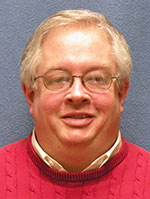Reflection / Sean Gallagher
Christ-like power is found in suffering witness of Nicaraguan Bishop Álvarez
 On Feb. 9, the government of Nicaraguan dictator Daniel Ortega put 222 of its political opponents on an airplane headed for the U.S.
On Feb. 9, the government of Nicaraguan dictator Daniel Ortega put 222 of its political opponents on an airplane headed for the U.S.
All of these people had their Nicaraguan citizenship stripped and were expelled from their native land because they had publicly defended the dignity and rights of their fellow citizens against the oppression of the regime.
They came from all sectors of Nicaraguan society. Notable among them were Nicaraguan political figures, as well as Catholic clergy, seminarians and Catholic media professionals in the Central American nation.
But the man who has become the icon of resistance to Ortega refused to board the plane: Bishop Rolando Álvarez of Matagalpa, Nicaragua.
Set to be tried next week on spurious charges that he had conspired to undermine Nicaraguan sovereignty and had disseminated false news, Bishop Álvarez was instead quickly tried and convicted on the day after the deportation, sentenced to 26 years in prison and stripped of his Nicaraguan citizenship.
Ortega could have looked on the Church in his country much like Josef Stalin dismissed the role of Pope Pius XII during World War II when he said, “The pope? How many divisions does he have?”
But Ortega’s actions against the Church in his country are a clear sign that he recognizes it as a threat to his power.
“The Catholic Church, I think, is one of the main institutions that the Ortega regime really, really fears,” said Antonio Garrastazu, regional director for Latin America and the Caribbean at the International Republican Institute in Washington in an Associated Press article. “The Catholic Church [is] really the [one] that can actually change the hearts and minds of the people.”
Now languishing in Nicaragua’s notorious Modelo prison, Bishop Álvarez may not be able to preach in his cathedral’s pulpit, broadcast messages on his diocese’s Catholic radio stations (all shut down by the government) or communicate on social media, but his witness speaks louder than ever.
Like the Lord to whom he was conformed in his ordination, Bishop Álvarez is suffering with and for his people. And as the example of Christ in his passion, death and resurrection assures us, there is a strength in such loving self-sacrifice that cannot be overcome by such worldly men like Daniel Ortega who see power only flowing from the barrel of a gun.
Ortega may be able to expel his opponents or put them in prison. And he may try to cow the rest of the country into a quiet submission by such use of force. But he cannot ultimately control the minds and hearts of Nicaraguans.
God created our hearts and minds to be attracted to truth, beauty and goodness.
These divine qualities are at the heart of the Gospel that the Church preaches and stand in stark contrast to the lies, ugliness and evil of the Ortega government and other totalitarian regimes throughout history.
So many of them sought to stamp out the Church and the Gospel it shares like Ortega is trying to do now in Nicaragua. And, at times, it seemed like they succeeded.
But the 2,000-year history of the Church, shot through with the grace and power of God, shows us that the Church survives all the stronger the more its shepherds and faithful embrace the example of its suffering Lord.
As the start of Lent approaches, I invite you to pray and offer sacrifices for Bishop Álvarez and the persecuted Church in Nicaragua during this season of penitential preparation for the celebration of Christ’s dying and rising.
At the same time, as we see this Church in our own hemisphere suffering so grievously, we can take solace in knowing from our Lord and the history of his people that the Gospel will, in the end, be victorious.
(Sean Gallagher is a reporter for The Criterion, newspaper of the Archdiocese of Indianapolis.) †
 On Feb. 9, the government of Nicaraguan dictator Daniel Ortega put 222 of its political opponents on an airplane headed for the U.S.
On Feb. 9, the government of Nicaraguan dictator Daniel Ortega put 222 of its political opponents on an airplane headed for the U.S.